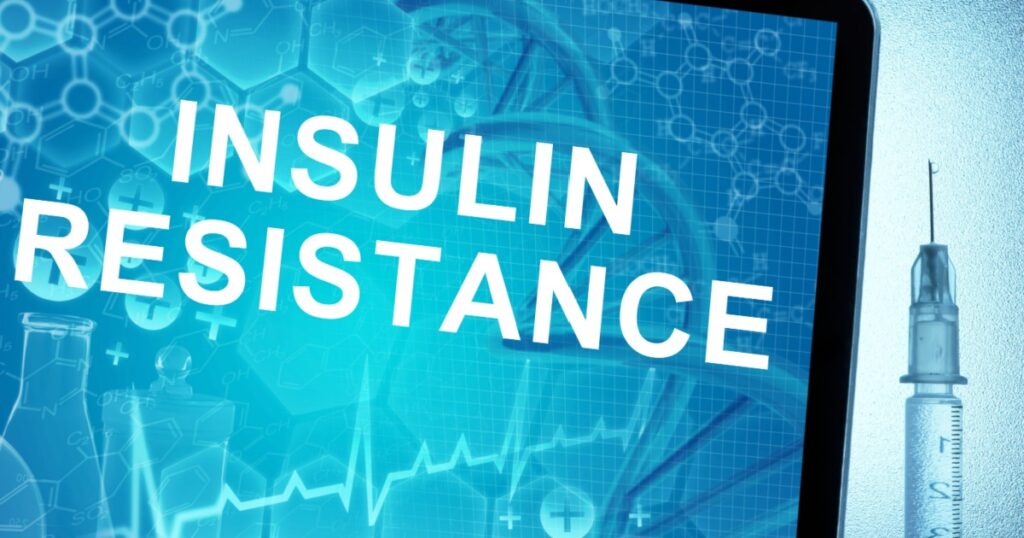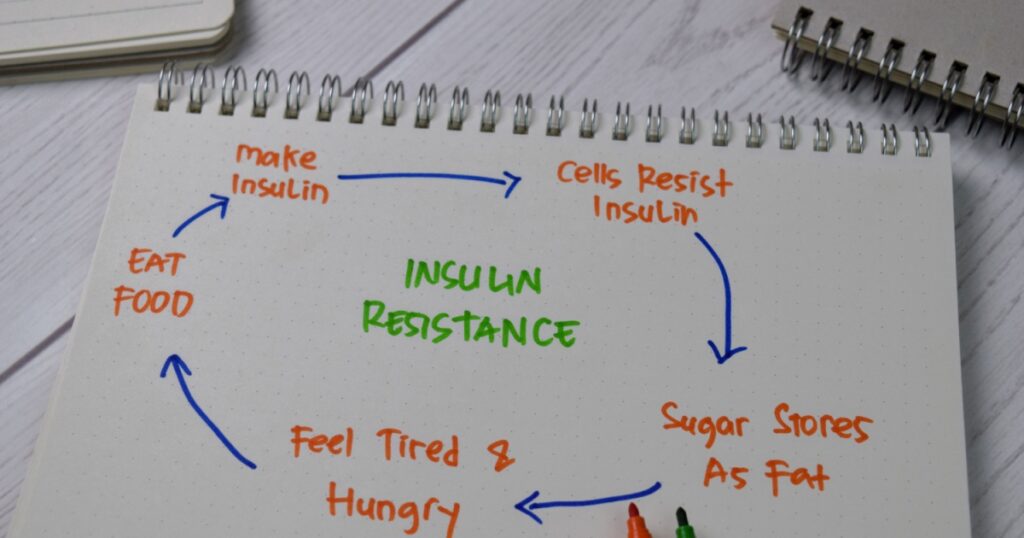Weight loss is a common health goal for many individuals, but certain factors can impede progress, with insulin resistance being a crucial aspect to consider.But what exactly is insulin resistance, and what is its impact on weight loss? These are 15 signs that indicate the presence of insulin resistance in the body, steps to take if you suspect insulin resistance, and the diagnostic measures your doctor may employ to confirm its presence.
What is Insulin Resistance?

Insulin is a hormone produced by the pancreas that plays a key role in regulating blood sugar levels and metabolism. Insulin resistance occurs when the body’s cells become less responsive to insulin, leading to impaired glucose uptake and increased blood sugar levels. This condition can pave the way for various health issues, including weight gain, obesity, and type 2 diabetes. (1)
Read More: Mark Cuban is Looking to Tackle the High Price of Insulin
How Does Insulin Resistance Affect Your Weight?

Insulin resistance can have a significant impact on weight management and weight loss efforts. When cells become resistant to insulin, glucose uptake is compromised, leading to elevated blood sugar levels. This can trigger the body to store excess glucose as fat, particularly in the abdominal region. Additionally, insulin resistance can disrupt appetite regulation, promote fat storage, and hinder the body’s ability to burn stored fat for energy, making weight loss more challenging. (2)
15 Signs of Insulin Resistance

Before being diagnosed in a medical setting, your body is likely sending you signals that insulin resistance is occurring. The hard part is that these signals can be very non-specific, meaning that they are often present for other conditions, as well. If you are experiencing several of these, however, insulin resistance could be likely.
1. Persistent Fatigue

Insulin resistance can lead to erratic blood sugar levels. This contributes to fatigue and fluctuations in energy levels throughout the day. (3)
2. Increased Hunger

Insulin resistance may disrupt hormonal signals that regulate appetite, This can lead to increased hunger and cravings.
Read More: 11 Signs You’re Not Getting Enough Magnesium and 20 Foods to Fix It
3. Frequent Urination

Elevated blood sugar levels associated with insulin resistance can cause increased urination. This is because the body is attempting to eliminate excess glucose.
4. Weight Gain Around the Abdomen

Insulin resistance can promote the storage of visceral fat around the abdomen. This can lead to increased waist circumference and fat around the midsection.
5. Skin Changes

Skin conditions such as acanthosis nigricans, characterized by darkened patches of skin, can be indicative of insulin resistance. These patches often feel velvety in texture.
6. Brain Fog

Insulin resistance may impact cognitive function. This can lead to difficulty concentrating and experiencing what’s called “mental fog”. (4)
Read More: Warning: Tom’s of Maine Products Aren’t As Natural As You Think – This is Why
7. High Blood Pressure

Insulin resistance is linked to hypertension, which can further increase the risk of cardiovascular complications.
8. Polycystic Ovary Syndrome (PCOS)

Insulin resistance is a common feature of PCOS, or Polycystic Ovary Syndrome. This is a hormonal disorder that can affect women’s fertility and health. (5)
9. Irregular Menstrual Cycles

Women with insulin resistance may experience irregular menstrual cycles due to hormonal imbalances. (6)
10. Skin Tags

Insulin resistance has been associated with the development of skin tags. These are benign growths that often appear in skin folds.
Read More: Foods You Should Consider Eliminating if You No Longer Have a Gallbladder
11. Increased Triglyceride Levels

Insulin resistance can lead to elevated triglyceride levels. This is a type of fat in the blood that can raise the risk of heart disease.
12. Sleep Disturbances

Insulin resistance may disrupt sleep patterns. This will lead to insomnia or poor-quality sleep.
13. Mood Swings

Fluctuations in blood sugar levels due to insulin resistance can impact mood stability and trigger mood swings. (7)
14. Chronic Inflammation

Insulin resistance is linked to systemic inflammation. This can contribute to various health issues, including weight gain. (8)
Read More: Most People Have Never Eaten This Odd Root Vegetable, But It Has Incredible Health Benefits
15. Slow Wound Healing

Impaired insulin function can delay wound healing processes. This affects the body’s ability to recover from injuries and infections.
What to Do If You Suspect Insulin Resistance

If you exhibit multiple signs of insulin resistance or suspect you may have this condition, it is crucial to seek medical advice promptly. Your doctor may perform tests such as fasting blood sugar levels, oral glucose tolerance tests, and HbA1c tests to diagnose insulin resistance definitively. Additionally, lifestyle modifications, such as adopting a balanced diet, regular exercise, stress management, and adequate sleep, can help improve insulin sensitivity and support weight loss efforts. If your doctor does find you to have insulin resistance, he or she may recommend medication to help manage your blood sugar levels. In some cases, insulin resistance can be reversed with lifestyle changes alone. However, if you have been diagnosed with prediabetes or type 2 diabetes, it is important to work closely with your doctor to develop a treatment plan that includes both lifestyle modifications and medications as needed
The Bottom Line

Insulin resistance is a complex metabolic condition that can significantly impact weight management and overall health. By recognizing the signs of insulin resistance and taking proactive steps to address it, individuals can potentially improve their insulin sensitivity, support healthy weight loss, and reduce the risk of developing chronic diseases such as diabetes. Consultation with a healthcare professional is essential to confirm the presence of insulin resistance and develop a personalized treatment plan to optimize health outcomes.
Read More: Popcorn May Have a Connection to Lower Risk of Dementia: Study
Sources
- “What is insulin resistance? A Mayo Clinic expert explains.” Mayo Clinic
- “Insulin and weight gain: Keep the pounds off.” Mayo Clinic
- “Insulin Resistance.” Cleveland Clinic
- “What causes brain fog? The metabolic health connection.” Levels Health. Meghan Rabbitt and Thu Huynh, PhD. April 11, 2022.
- “All Women With PCOS Should Be Treated For Insulin Resistance.” NCBI. John C. Marshall, MD, Ph.D and Andrea Dunaif, MD. January 2012.
- “Association between insulin resistance and abnormal menstrual cycle in Saudi females with polycystic ovary syndrome.” NCBI. Khulood Hussein and Mohammed Karami. June 2023.
- ” Insulin resistance in brain alters dopamine turnover and causes behavioral disorders.” NCBI. Andre Kleinridders, Weikang Cai, Laura Cappellucci, Armen Ghazarian,b William R. Collins, Sara G. Vienberg, Emmanuel N. Pothos and C. Ronald Kahn. March 2015.
- “Macrophages, Chronic Inflammation, and Insulin Resistance.” MDPI. He Li,Ya Meng, Shuwang He ,Xiaochuan Tan,Yujia Zhang, Xiuli Zhang 1,Lulu Wang and Wensheng Zheng. September 26, 2022.

